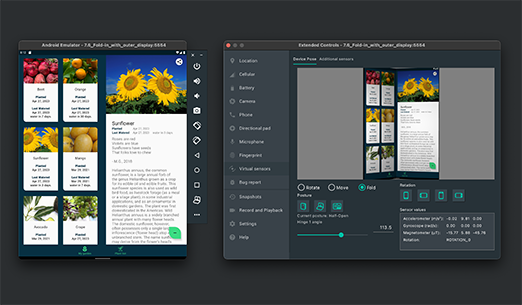Android is a powerful operating system primarily used for mobile devices. Since its inception, it has become one of the most popular platforms for developers and users alike. In this guide, we’ll explore what Android is, its key features, and why it’s a significant player in the mobile development world.
The History
Initially developed by Android Inc., which was later acquired by Google in 2005. The platform was designed to be a flexible, open-source that could be adapted to a variety of devices, from smartphones to tablets and beyond. Its first public release came in 2008, and since then, Android has undergone numerous updates, each bringing new features and improvements.
For more details on history, you can visit the official history page.

Key Features
Offers several key features that have contributed to its success:
• Open Source Nature: Based on the Linux kernel, making it open-source and highly customizable.
• Vast App Ecosystem: With millions of apps available on the Google Play Store, Android offers something for everyone.
• Google Services Integration: Devices come pre-loaded with Google services like Gmail, Google Maps, and Google Drive, enhancing the user experience.
Why Choose Development?
Choosing development offers several advantages:
• Large Market Share: Dominates the global mobile OS market, giving developers access to a vast user base.
• Open Development Environment: Open-source nature allows for extensive customization and flexibility in app development.
• Diverse Device Compatibility: Runs on a wide range of devices, from budget smartphones to high-end tablets, making it versatile for developers.
The Importance in the Mobile World
Android holds the largest market share in the world of mobile. Its open-source structure allows manufacturers to customize their devices while providing developers with the opportunity to reach a vast user base. Additionally, powerful app ecosystem, through Google Play Store, gives users access to tailored to their needs.

Why Popular
Android’s popularity stems from its flexibility, customization options, and the wide range of devices it supports. This has made Android the preferred choice for both manufacturers and users.
The Fundamentals of Android Development
Android development is done using tools like the SDK (Software Development Kit) and other development environments. Java and Kotlin are the most commonly used programming languages for app development. Android Studio is the development environment that allows developers to write code, debug, and test applications efficiently.
Key Tools for Android Development
The SDK, along with Android Studio, forms the foundation for developing apps. These tools provide everything a developer needs to create high-quality apps.
Choosing Between Java and Kotlin
Java and Kotlin are both powerful languages for Android development. While Java has been the traditional choice, Kotlin offers modern features and a more streamlined syntax, making it increasingly popular among developers.

If you’re interested in learning more about mobile development languages, check out our article on Kotlin for Android Development.
Challenges in Android Development
Despite its many advantages, developing does come with challenges:
• Fragmentation: The wide variety of devices and screen sizes can make it challenging to ensure a consistent user experience.
• Security Concerns: The open nature can lead to security vulnerabilities, requiring developers to be vigilant.
Focus on Security
Security is a top concern for Android developers. It’s crucial to implement robust security measures to protect user data and maintain trust. Regular updates and patches are essential to address vulnerabilities.
The Android Ecosystem and App Development Process
Google Play Store is the primary platform where applications are published. Android developers use this platform to reach of users worldwide. Developer community caters to a wide range of skill levels, from beginners to experts, and offers a constantly growing support network.
Publishing on Google Play
Publishing your app on Google Play gives you access to a global audience. Understanding the publishing process and optimizing your app for the Play Store are key steps in your app’s success.
The Role of the Developer Community
The developer community provides invaluable support and resources for developers at all levels. Engaging with this community can help you stay updated on the latest trends and best practices.
Why You Should Become an Android Developer
There are many advantages to becoming an developer. One of the largest mobile platforms globally, giving developers the opportunity to reach a wide audience. Additionally, the open-source nature of provides developers with great freedom and flexibility. As an developer, you have the potential to advance significantly in your career.
Conclusion
Android is one of the most important in the mobile world, and becoming an developer offers many benefits. The vast opportunities offered by the ecosystem present great prospects for those who want to pursue a career in this field. If you are interested in mobile app development, now might be the right time to become an developer.


